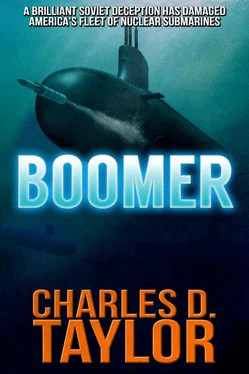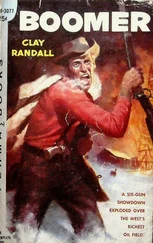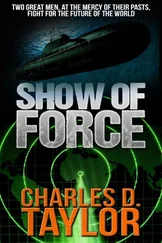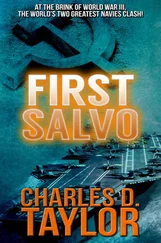Lieutenant Commander Burch was as curious as he was perplexed. There were rarely any ifs in his world. A SEAL on a mission normally only ran into bad guys, and they were quickly dispatched. “It’s beyond me what you think I can possibly do, Captain.”
“You can find either Florida or the other submarine just as well as any of us, maybe better. Or at least you can provide us with the means. I had a captain one time who spoke about the value of imagination in a situation like this. I know how I’d probably run my search, and that could be exactly the way I’d locate my targets. I might also miss them completely by being so damn precise and acting just like a submariner, particularly if one of them hears me first. It’s easy to see what we have to do, and all I want you to try is to place us where it seems we have the best chance of finding our quarry.”
Burch glanced curiously at Steel. He was uneasy with the idea. “I don’t think I could offer any more than any of your own men. It seems pretty obvious.…”
“I couldn’t agree with you more. That’s the only reason I called you up here. The obvious could be our biggest mistake. It’s the luck I’m looking for, that extra something that we might overlook. Go ahead. The quartermaster will put an overlay on the chart so you can play with it without messing up his pretty picture. I already know what I’m going to do. I’m going to bring us around to head toward the middle of the sector right now. We’re pretty sure we know where they aren’t. That’s where we’ve already been. So why don’t you come up with a couple of ideas for me to find out where they are. When I’m sure you’re pissing up a rope, you’ll be the first to know. What could be more fun?”
After a short lesson on the capabilities of the various sonars on board, from the sphere in the bow to the hull-mounted hydrophones to the array towed aft, Lieutenant Commander Burch experimented with possibilities until the chart overlay looked like a madman’s scratch pad. There were diagonals, star-shaped tracks, geometric designs, and spirals. The final determination was simply that if they had been following Florida without success and were now turning away from her, they would have to sweep back. The other OOD’s each took a turn at analyzing the problem as soon as they realized Ben Steel was looking for the optimum possibilities for locating the needle in the proverbial haystack.
Burch learned as he watched. It was Steel who let him decide that it was better to search the area they had been moving away from and then sweep back in a long spiral to catch their prey if they had indeed been following it. After turning more to a west-northwest course, Steel was satisfied that they had incorporated not only the most logical approach, but also the one that allowed a bit of luck to ride with them.
“I want to be ready for a snapshot,” he told Peter Simonds. “Our intruder could be just sitting by himself waiting for a target to show up. I can imagine that we might be on top of each other before we know it. I hope so.” If the enemy submarine was able to remain as quiet as Florida, it could be just like an ambush. The first one to shoot would be the likely winner. The only difference was that the loser who went to the bottom after a single shot would take more than a hundred men with it.
Pasadena had come close to periscope depth momentarily to copy her broadcast before returning to depth to continue her search pattern. As she came to a zero bubble at three hundred feet, the ominous click of the IMC system echoed through each compartment. There was a time aboard Pasadena when an announcement had been something for the crew to look forward to. But at this stage of their existence, that had become ancient history. It had been only a matter of days — was that all? — yet to most even this small pleasure had disappeared in the sands of time. The announcements had become tedious, overbearing lectures.
Tension was thick in the air. It was beyond the scope of even a genius to invent a scrubber capable of purifying that. Every man could smell it! Feel it! It was transferred from one watch section to the next. It came from the man next to you, oozing slowly across the deck, up the bulkheads, along the overhead, and it gradually covered each of them. They were at war … with the Russians? Or was it with themselves? With each other? With their captain? They didn’t know, not really, and when the 1MC clicked on there was an increase in the tension, a silent electric discharge creating a human aroma of ozone.
“This is the captain.” Who else could it be? Newell was the only one who had used the system in the past two days. “Once again, Pasadena is approaching a moment in our mission that may influence American history beyond anything you can imagine. In the past few days, each one of you has faced tremendous odds and reacted in a manner that has brought honor to yourselves and your families. You have shown the world that one hundred thirty distinctly different individuals can be molded into a crew capable of preserving the ideals upon which our nation was founded.”
That was what they had expected, what they feared most — another pep talk, a morale builder. It was the opposite of what they wanted. News was what they cared most about. But Pasadena seemed cut off from the world — except for orders from SUBPAC. What was happening at home, if there was still a home? Was this the end of the world? Was it…? Anything but this.
Newell’s voice sounded deeper than usual and seemed to catch when he uttered some of the pat phrases he’d selected. Pasadena’ s captain was a true believer in motivation, and he was a student of human behavior. He’d observed the attitudes of his men the past few hours and the results were patently obvious. Every word he had ever read about men in war, battle fatigue, personality conflict in time of stress, was displayed on each face he’d encountered. The men had expressed their concerns — yet not one of them was afraid for himself. Their only fears were for the war on the surface and the danger to their families. That was something he couldn’t help them with. Those who controlled Pasadena’ s communications had chosen to isolate her. This type of problem had been overlooked. If he could have come up with something, anything, it might have helped — just this once — but he remembered nothing in his background that could fashion an answer to what they were looking for.
The information that had come to Pasadena was in the form of succinct naval messages. That was a format that contradicted the imagination. Of necessity, it was vague, businesslike. Their orders, their mission — that was all that the Navy was concerned with at this stage. That only encouraged each one of them to interpret for himself exactly what was happening on the surface.
Yet there was an ominous note to those few, short messages, a hint that the civilian population of the United States must be in peril, perhaps already under attack. That was what lurked in each man’s mind.
Wayne Newell would be the first to acknowledge that sonar’s initial identification of the two submarines they had sunk had magnified his problems. But what was certainly weighing on their minds even more, the fate of their families, should be of even greater concern. He would make it so. Was there a home they were still fighting for? Or would they find scorched cities if they ever returned? He wanted them to have something more to worry about than the masking device that made Soviet boomers sound American.
The recent communications received by Pasadena had been calculated to enhance the importance of her mission. The continued existence of a Soviet ballistic-missile threat at sea was vital to Pasadena’ s maintaining a high degree of readiness. Their morale, their sense of mission, their unselfish efforts, might just save their families. This he believed with all his heart.
Читать дальше












